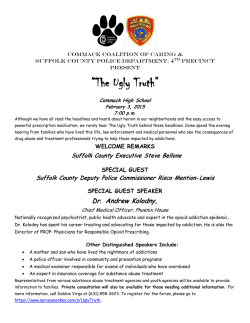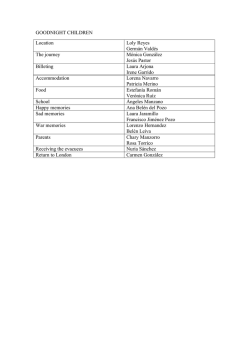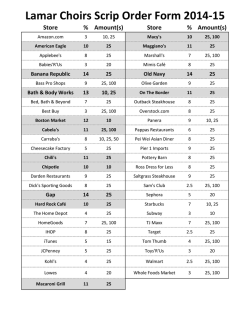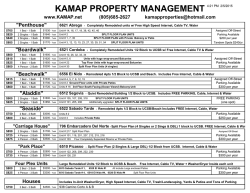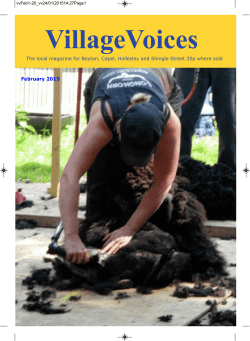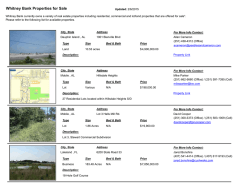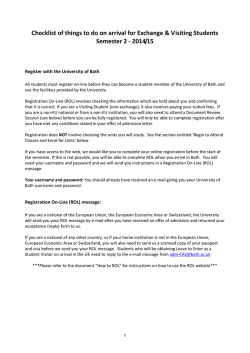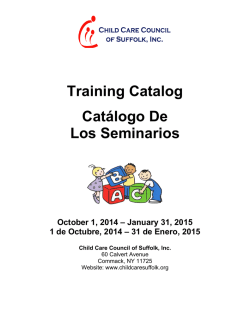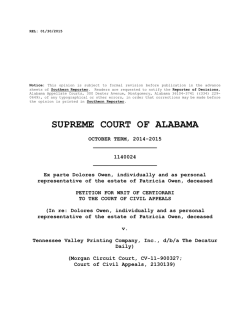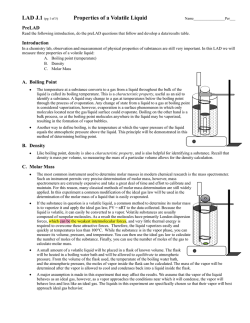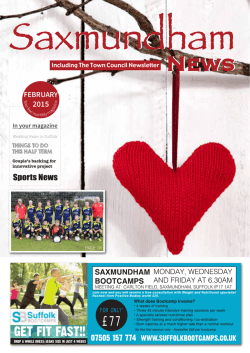
Sudbury Update Jan 2015 - Suffolk Family History Society
SUFFOLK FAMILY HISTORY SOCIETY SUDBURY & DISTRICT GROUP Update January 2015 TONIGHT’S SPEAKER We start the year with our usual January speaker and friend Martyn Roper with his talk entitled ‘The de Vere’s of Castle Hedingham, a medieval dynasty’. Sue has, once again, organized another year of interesting speakers for us to enjoy and learn from. If you have any suggestions for other talks please let her know. Who Do You Think You Are? Live 2015 Who Do You Think You Are? Live returns in a brand new venue and with a new date: Birmingham’s NEC on 16- 18 April 2015 QUIZ NIGHT Anne and I have worked on another Quiz for February. It is a general quiz so you won’t have to be a genealogist to answer the questions. There are refreshments and a raffle. Teams of up to 6. Bring a friend. Have fun!! DO YOU NEED HELP? If you need help with your Family History research please talk to any of the committee members. We don’t always have access to our research material (IGI & some parish records on fiche & many books) which we store here but if you would like to look at anything in particular let us know and we will try and get it out or have it ready for the next meeting. MEMORIES...... In the last newsletter I printed the following and asked for your memories, pleased to say we received 2 responses. Please share yours too….. Sweet cigarettes; Coffee shops with juke boxes; Home milk delivery in glass bottles; Party lines on the telephone; Newsreels before the movie; TV test patterns that came on at night after the last show and were there until TV shows started again in the morning; Peashooters; 33 rpm records; 45 RPM records; Hi-fi's; Metal ice trays with levers; Blue flashbulb; Cork popguns; Wash tub wringers If you remembered 0-3 = You're still young If you remembered 3-6 = You are getting older If you remembered 7-10 = Don't tell your age If you remembered 11-14 = You're positively ancient! Hi Helen, your little "Memories" article made me titter a bit last Tuesday, I could remember just about everything so does that make me an ancient ruin! I sat quietly and thought about my childhood memories and a couple came to mind, hope you find them amusing. "Do you remember the days before plumbed-in bathrooms when "Bath Night " meant father bringing in the tin bath which used to hang on the wall outside the kitchen door, of mother boiling bowl after bowl of water on a gas ring ( before the days of a Sadia Water Heater ) which dad would carry through to the dining room and pour into the bath on the floor in front of the fire, especially in the winter, of being the youngest of three children who was the last in the queue and by which time the water was either luke warm or cold, of poor old dad then having to empty the bath by reversing the loading procedure. Remember the night when us children would be packed off to bed early so that they could have their bath night without the kids. If this was your childhood bath night then you are older than you think!!" "Wash day, what a performance. My mother always did the washing on a Friday and a Monday, why? who knows, it was tradition. Mother would start about six or seven in the morning with the wash, she had a Baby Berco water heater so the clothes went into this and boiled then taken out and transferred to the old stone sink for rinsing. Outside the back door stood a hand operated mangle through which mother, red of face, would squeeze the water from the clothes before they were hung out to dry. On a good day the washing was dried, ironed and put away by early evening, if the weather was wet everything was draped over a clothes horse around the fire, and she still had time to create a meal for three hungry children and a husband. How many of you remember the smell of damp washing around the house? As technology improved dad bought mum a spin drier which would stand beside the boiler so that mum could lift the wet washing out of the boiler into the spinner, next came a twin-tub which was a wonder of modernism, it took mum some time to get to grips with it but she mastered it in the end, finally came a modern fully automatic all singing all dancing washing machine which dear old mum eventually mastered by the time she was on her own and had reverted back to washing her "smalls " in the sink to save time. I sometimes think about the modern labour saving devices we all have nowadays and how we would cope with what our parents and grandparents had to. Makes you think!" Richard Moss Dear Helen, Here are some of thoughts about how life has changes since ‘the good old days’. One of my main memories concerns the winter cold indoors. Not only was there no insulation or central heating, I do remember the winter draughts. The draught around the windows was icy. We had sash windows but the sashes always broke at the worst moments and weren’t repaired for months, so they would stay wedged at odd angles. I would wake up and go to the bedroom window and try to look out but the pane would be covered with wonderful ‘Jack Frost’ patterns. People get excited by snow flakes but they are hard to see, while the frost on my window was full of beautiful leaf-like patterns which I could see easily. Still on the subject of draughts, trying to get in or out of our one warm room in the house could be a problem because of the sand filled draught-excluders that were put in place behind the door. I well remember rushing out to ‘pay a visit’, sliding along the Lino in the hall, a pull of the chain and then back to the living room only to find I couldn’t get back in again because the draught-excluder was back in place. Or perhaps they weren’t telling me something…. While on the subject of spending a penny, hasn’t inflation made a difference? Also I would challenge anyone to use Andrex trace the map for Geography homework! The old hard toilet paper was also good for putting with your comb to make a cheap ‘musical instrument’. I grew up when sweets rationing was still running. I think we had 2oz of sweets a week, but because we did not have much, we often forgot to eat them, so our sweeties would all fuse together in one sticky lump that was also stuck to the paper bag they came in. Nothing like chiseling off a lump, and then sucking the paper off it before you could enjoy the reward. Similarly, did you have a weekly Corona fizzy drink delivery? The joys of American Cream Soda, Dandelion & Burdock or Cherryade. Do you remember the bottles with the cunningly wired on stoppers? I could do the bottles up, but I couldn’t undo them without help. Similarly when my friend and I used to go to watch the football together (aged about 10), we used to spend a lot of the game looking for bottles that we could take back to get the deposits. We had an early Sainsbury’s, with all its tiling inside. My mother knew how to keep me happy while we queued for everything. I would be propped up so I could watch the butter patters in action. I loved watching them make the neat butter bricks and wrap them neatly in special grease-proof. Talking of wrapping, the first thing I can remember making at school aged 4+ is a properly folded sugar bag out of paper. Sadly, I had mixed up my paper cutting and had a thin bag unlike everyone else’s chunky ones. Oh the shame, and I have never had any counseling! Going to the cinema was different because you could arrive at any time, watch until it was time to say ‘This is where we came in’, and go out again. Going by bus, you could also jump on and off from the platform at the back without waiting for the proper stops. It was also a chance to get rid of that bobsworth of coppers (big and heavy, with portraits of a range of monarchs) that were making a hole in your pocket. On a local note, my late and much missed friend John Deeks told me how, when electricity was installed after the war where he grew up in Little St Marys, they fitted wiring for 4 bulbs (1 for each room) and 1 socket for the house. Why would anyone want more? Finally, the last Update did describe cycle clips as a lost fashion. However, I must point out that you can still buy them. The difference is that in the good old days, people cycled because they wanted to go somewhere (work, shops) and so went in their everyday clothes (I didn’t have any other kind), but now cycling is a lifestyle decision with fashion accessories. Also what happened to the guard to keep women’s skirts out of their back wheel? On a similar note, I can remember when I did not need a helmet even on my motorbike – the fashion choice was the reversed flat cap and goggles! Martyn Roper I can still remember the smell (cheeses and bacon etc) of our local Sainsbury, and queuing up at each individual counter Helen QUAY THEATRE Don’t forget the popular ‘History of Sudbury’ talks (6 in all) tickets available at the Quay Box Office 01787 374745 JEREMIAH GOODY Jim Lock is looking for a connection to a Jeremiah Goody from Glemsford who stole cutlery from the Rose and Crown in 1790 and was whipped around the town. He thinks story came from Norwich and Bury times. Please talk to Liz if you can help with this QUOTE For all those struggling to have a New Year clear out be comforted by these words:"The superfluous is very necessary" - Le Mondain (1736).v.22 Barbara Stewart SUDURY POLICING Information wanted - by Sudbury History Society member Ian Cruttenden “The Town and Borough of Sudbury has maintained law and order by various means from the Anglo-Saxon period to today. In earlier times it was the responsibility of the Headborough or Tythingman representing approximately ten families who held sway. Later the Petty or Parish Constable was voted annually to carry out the task – no pay and he still had to do his normal job. It was not until the Municipal Corporation Act of 1835 that Towns and Boroughs were permitted to raise full-time paid police officers, called Constables. During times of unrest it was possible for the Magistrates to swear in additional Constables to support the permanent police. Later Special Constables were signed –up to provide a pool of additional resource. During the First World War many men of the young men serving with the Constabulary joined the Army and Navy. Measures were taken to increase the Special Constabulary to account for the loss of manpower and many older or retired men joined the Specials. In 1919 George V created the Special Constabulary Long Service Medal for their service during World War 1. An example is on display at the Sudbury Heritage Centre. The same happened during World War II. It seems likely that many men who served in the Specials were living in the Sudbury area. Would anybody who knows of anyone who served in the Sudbury Borough Constabulary, Suffolk Constabulary or the West Suffolk Constabulary, in the Sudbury area, please contact me as I am seeking information and photographs of people carrying out police service. My e-mail address is: [email protected]. Thank you for any assistance that you might be able to offer. Ian Cruttenden WHY YOUR ANCESTORS PROBABLY DIDN’T GO TO WORK ON 7 OCTOBER 1857 The Indian Mutiny was sparked off when the British issued new rifles to the Indian soldiers in the British army in May 1857. To load and fire this rifle the soldier had to bite off the end of the cartridge which was greased with fat assumed by the Indian soldiers to be either pig or cow. To Muslims, pigs were ‘unclean’ and to Hindus the cow was sacred. The two religions were suddenly united against the British. Rumours flew around on both sides and violence flared until revenge grew into uncontrolled barbarism on both sides. When word of all this reached Britain, it was seen as a visitation from an angry God. One way to appease him would be to have a National Day of Fast and when everyone should beg God’s forgiveness for not having spread the Christian word enough in India and converted a lot of people there to Christianity (whether they wanted to be converted or not). So, back in England, banks and businesses were suspended and shops shut their doors. In effect, Britain closed down for the day. Special services were held in churches, and millions of people praying in those churches would surely make God look kindly on us again... after all, he had trusted us with India but we hadn’t converted ‘enough’ folks there. Indeed, on the whole, we hadn’t been very nice to the locals - not very Christian-like at all: encouraging the opium trade, ‘acquiring’ territory, being dismissive of local customs and rulers, disrespectful and arrogant, to say the least. (Surely that been far more of a ‘sin’ than failing to convert many Indians?) But some Indians said the British had been trying to enforce their culture and religion on the natives (even though God didn’t think so) so the British government said that in future, we wouldn’t interfere with the local religions, i.e. we would stop evangelising which was what, apparently, we hadn’t been doing enough of in the first place... It is difficult to appreciate now that this archaic line of thought fulminated into the government-backed, nationwide Day of Fast and Humiliation. (I have been unable to trace the last such day in Britain - I suspect that the idea was quietly dropped not long after this.) Some politicians blamed the Indian Mutiny on British misrule and advocated that the Indian people should be allowed to elect their own government. I wonder how many people regarded this as an unexpected and welcome day off work although I doubt they would have been paid! LOCAL NEWSPAPERS AS SOURCES OF INFORMATION If you are searching for newspaper reports of events that your ancestors were involved in or might have simply known about, there are two websites that you can try: British Library’s C19th newspapers (note this is only 1801-1899) (available free through Suffolk Libraries website – you’ll need you library card number) and FindmyPast’s Newspaper database British Newspapers 1710-1953 (paid subscription or use it in free in the library). Both have scanned images of the newspaper pages. Don’t worry too much about looking for a name, there is a ‘keyword’ box you can use for, example, a place name or anything else. Just specify the date or date span you are interested in. Also, don’t worry about finding a newspaper specific to the town you want. Very many reports and stories were published in newspapers of other towns. For example, the Rochdale Observer (Lancashire) has scanned images of its pages for very many years but not 1867 – the year I wanted (typical). However, I keyed in the location in Rochdale where a political meeting was held – Cronkeyshaw – rather than just ‘Rochdale’ which would yield a lot of irrelevant references and, hey presto, there were 14 references, most relating to the meeting I was looking for in newspapers published in London, Canterbury, Dundee, Surrey, Norfolk and several other local newspapers so the fact that the Rochdale Observer was not on the database didn’t matter. So, don’t be too focused and specific – less is more – and think ‘out of the box’. Anne Grimshaw RON GREENSLADE We recently received the sad news that Ron has passed away suddenly at his home. He was a well loved and respected member of our Society, together with Jean he was an active member of the Bury St Edmunds branch and was member of the committee for many years. Without doubt his greatest achievement for the Society was managing the transcribing and indexing of the Suffolk Burial Index burials 1538-1900. This disc has the details of over 1.2million entries, and although it was by no means "one man task", Ron was always acknowledging the support he received from his colleagues, without his drive and determination I wonder if this mammoth task would ever have been completed. Doug Howlett, Chairman Richard Humphries of Humphries Weaving who spoke at our October meeting, has a new company website: http://www.humphriesweaving.co.uk/ TRIPS At present, no trips have been planned for this year. If you have any suggestions please talk to Sheila NEXT MEETINGS: 24 Feb Quiz Night – All welcome 31 Mar Music Hall Memories A pocket history of British Music Hall Bryan Thurlow 28 Apr Antiques Roadshow – NO Valuations Members own old and interesting items Barrie Stevenson 26 May The History of Sue Ryder+ Group AGM Phyllis Felton The full programme is available at the desk, please help yourself PLEASE TAKE A POSTER TO DISPLAY NEED TO GET IN TOUCH? Sheila Piper: 01787 248260 Penny Daldry: 01787 370598 Helen Richardson: 01787 376287 [email protected] Suffolk Family History Society A Company Limited by Guarantee no. 4191740 Registered Charity no. 1087748 A Member of the Federation of Family History Societies
© Copyright 2026
